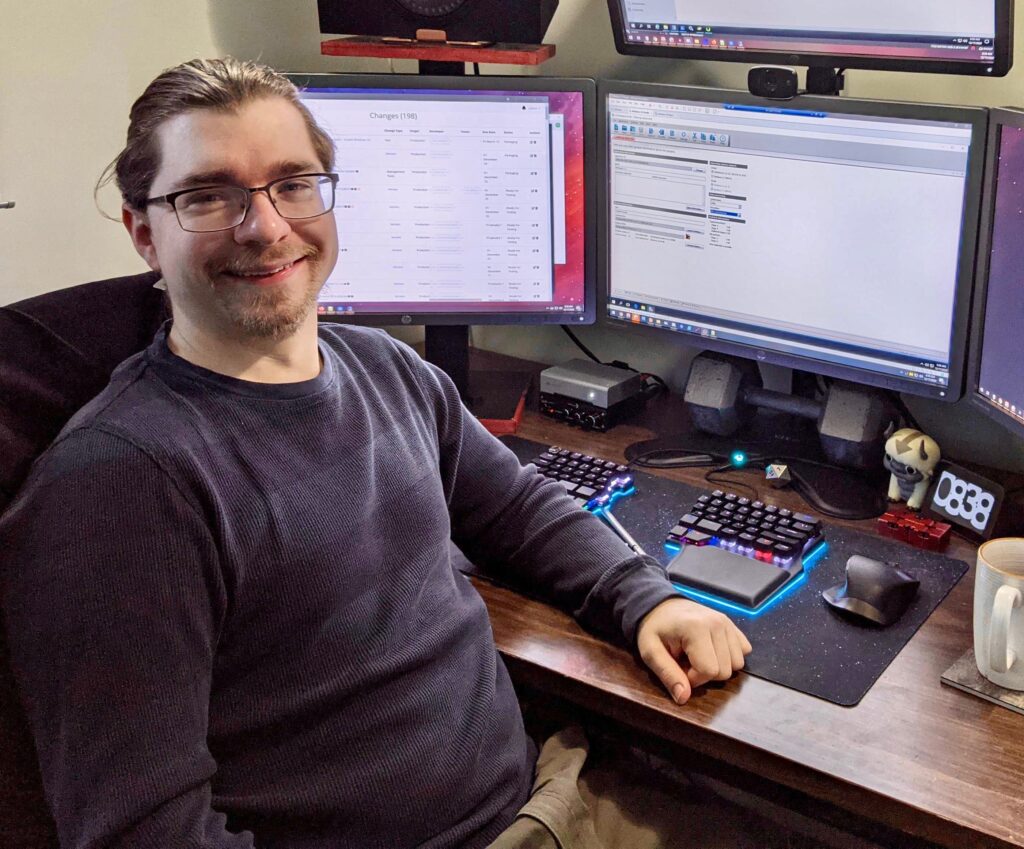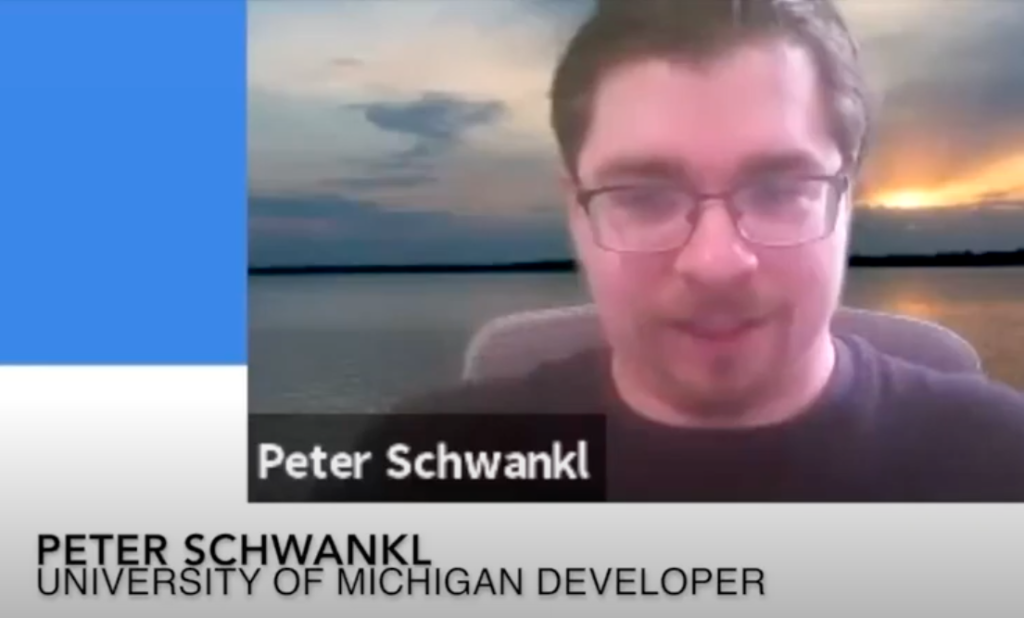2007 Community High grad talks about why he volunteered for Hour of Code, how CHS teachers set him on a solid path to a great career, and why he believes none of us really knows what we’re doing

By Jo Mathis/AAPS District News Editor
Ann Arbor native Peter Schwankl attended Wines Elementary, Forsythe Middle School and Community High before earning his bachelor’s degree in secondary computer science education with a minor in communication and theater arts at Eastern Michigan University.
He began work shortly after graduation at the University of Michigan as a desktop support specialist for the School of Social Work, while working towards a master’s degree in technology management over several years at EMU.
Schwankl now works in IT system administration for U-M’s central IT service for the main campus. As part of a roughly 20-person engineering team that provides the software infrastructure, design, and delivery for the MiWorkspace managed OS environment, he supports about 15,000 users on 11,000 computers. His primary work revolves around packaging software for deployment to the Windows environment with a focus on scripting and automation.
A few extra hats he regularly wears include developing in-house tools and custom infrastructure for support staff, generating complex reports via scripting, and the primary engineering support for the campus’ PCI-compliant desktop OS environment.
Calling himself a “giant nerd,” Schwankl says he enjoys reading, board games, pen and paper RPGs, PC gaming, as well as being an avid maker, particularly enjoying woodworking and crafting high-performance Nerf blasters.
Why did you want to take part in the recent Hour of Code in which local professionals talked to AAPS middle and high school students about their computer-related careers?
It was brought to my attention by a coworker. I was really excited to take part because I wanted to give back to the district that I graduated from! After talking with students though, I found it actually really affirming of my career decisions and path to talk about my professional growth both with other professionals and to students who are standing in the doorway of that first daunting step towards post-high school life.
What do you hope students take away from what you told them?
I think what I’d want to reinforce for students is that I think all of the people on the speaker panel in my meeting made it pretty clear that they didn’t have a 100 percent vision of where they wanted to be, or where they’d expect to end up when they decided to start college.
I can remember the doubt, apprehension, uncertainty, anxiety around taking those first steps.
I’d want to reassure students this: Your decisions today are not chiseling your destiny in stone, but taking the first few steps in a direction. What you do after high school is about learning—both foundational skills in a field, and about yourself.
What are you good at? What do you enjoy doing? Pursue your expertise and your happiness first; it’s almost certain there’s something out there near the intersection of those two things. Often, yes, that means going into some sort of post-high school education. Does that mean a certificate program? An apprenticeship track? A two-year degree? A four-year degree? A master’s degree beyond that? A Ph.D. even then? There are rarely if ever wrong answers here. None of these—especially those last two—are something you’re signing in blood for after you walk across the stage at your high school commencement.
It’s graduation, not a sentencing; your name was not just drawn from the Goblet of Fire; you are not taking the One Ring to Mordor—although, canonically, Frodo did wait for 17 years before starting his journey.
Granted, hobbits perhaps have a slightly unique definition of the term “urgency.” But maybe just take a semester or two off rather than 17 years if you go that route?
I digress. Shout out to Ken McGraw and the Fantasy Literature class at Community.
It’s where you get to start making a lot of decisions about what drives you. That’s a big, scary step all on its own.
Unfortunately, being handed a whole lot of autonomy in decision-making means you start having to take all of the responsibility for those decisions. A darker implication of this is that imposter syndrome can hit hard. It’s real, and it sucks. You will have moments when you feel like you have no business being where you’ve decided to be; you’ve made a terrible choice, and you will never amount to what you feel is necessary. I still have those moments, and not infrequently. Some days are better than others, some weeks are better than others. This happens to everyone, even Adam Savage (yes, that Adam Savage.)
It’s okay. It really is. While many people would cite that “everybody has to start somewhere,” or “the master has failed more times than the student has tried,” that doesn’t often help when you’re in the depths of feeling like you’ll never amount to your goals no matter how hard you try. Perhaps closer to the truth is that even the master is still making mistakes—often big ones. Regularly. I’ll let you in on a little secret of adulthood: None of us knows exactly what we’re doing; you’re not alone. Going a step beyond this, and perhaps even turning this on its head a bit, come to terms with not being the smartest person in the room. Try to get comfortable being in an environment where you’re going to keep learning and growing, whether that’s in a classroom or on the job.
Thanks to all AAPS staff for arranging the opportunity to speak to students! I hope my insight is helpful to at least some.
How did Community High School prepare you for life after high school?
My mother jokes that Community “kept me from going to prison” because I struggled a lot in middle school, and I was really fortunate that Community and the amazing staff there gave me the chance to get my feet underneath me again.
Enormous thanks especially goes to my forum leader and bedrock foundation, the legendary Judith Dewoskin; Jason McKnight for being an uncompromising mentor who saw far more in me than I saw in myself; Ken McGraw, for giving me a quiver of only three arrows and forcing me to hunt bullseyes in class discussions; Anne-Marie Roberts for putting on the biggest shows in the tiniest theater; Kathe Hetter for having the highest fire:science ratio of any class and keeping a well-stocked fridge; and last but not least, Ed Kulka and Dan Neaton for putting up with my aversion to math over four years.
It’s far easier to joke about this 15 years after the fact, but I wouldn’t be where I am today without those four years and all of these people in my life.
Community, I think, strikes a very hard-to-get-right balance between keeping a hand on the shoulder for students to keep them upright and headed in the right direction, while also starting to build the scholastic ownership that students need to be successful after high school.
For students who are college-bound, once you’re on your own at college, there are no bells to tell you when to get to class. That was easier for me to get used to; Community didn’t have any to begin with; I was expected to look at a clock and get myself to class on time. If you need something from your professor, you need to ask them directly. That was easier for me to get used to. Community fostered a student-driven collaborative environment between students and educators. If I needed something, it was expected that I would approach my teachers and work with them to further my own education. The relationship between student and forum leader is very similar to one in college you will likely have with a faculty advisor, or outside of college with a good manager. Colleges expect you to pick your own classes; so too did Community.
To be clear, while this question asks about specifically Community, these aren’t takeaways that are unique to those who have the opportunity to learn at Community. Certainly, Community is structured in a way that starts to build these skills and expectations that might not be as enforced by the culture or “business as usual” at Pioneer, Skyline, or Huron. They have, you know, bells that ring for starters last I checked. But recognizing that these are skills that collegiate and career paths will expect, and starting to think about them, is not unique or exclusive to Community students.
For those who aren’t college-bound, these are still valuable skills to have. Regardless of what your post-high school education looks like, whenever you make your exit from formal education, you’re expected to manage your own time, your own needs, and the demands upon you. You’re expected to communicate with those you work with to make your available resources such as mental capacity, time, skill level, physical assets, etc. known if they need to be known.
From there, you can figure out how to translate those available resources into…whatever. An assignment in class. A project at work. Dinner on the table. Learning how to identify and quantify your own personal resources, taking advantage of your strengths, mitigating your weaknesses, finding how to interface these abilities with the abilities of others (and, and, and…), is a life-long process that, for many, starts in earnest when they go off to college.
I believe Community turned that clock ahead four years but knowingly handed me a helmet to make sure I didn’t crack my head open on the pavement when they took the training wheels off. Scrapes and bruises are, however, inescapable. Mistakes and missteps are going to happen. You’re going to go down some false trails and turn around, maybe take a wrong turn you were sure was right and end up a bit lost, end up ‘taking the scenic route’. It’s not wrong or bad when these things happen; they’ve happened in some form to all of us. The journey informs the result as much if not more so than the destination, and there’s always another finish line to cross somewhere in the distance.


Be the first to comment